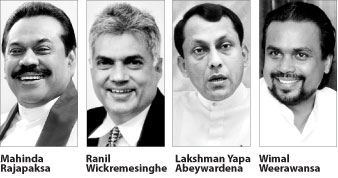Ilankai Tamil Sangam13th Year on the Web Association of Tamils of Sri Lanka in the USA |
|||
 Home Home Archive by Date Archive by Date Archive by Category Archive by Category About the Sangam About the Sangam Engage Congress Engage Congress Multimedia Multimedia White Papers White Papers Links Links Search This Site Search This Site |
Better to Close the Stable Even After the Horse Has Boltedby This is My Nation, The Nation, May 31, 2009
The victory parades are still being held, our war heroes yet being honoured, and that is understandable - the nation is still heaving a huge sigh of relief that, the 30-year-old war it waged on terrorism has finally come to a brutal but definite end.
Nevertheless, while we reflect on this signal achievement, it is obvious that, the issue which has been broadly called the ‘ethnic conflict’ has not been fully resolved and that, more needs to be done, better sooner rather than later. Thus, the Tigers were more an obstacle than an ally in resolving the grievances of the Tamil community. And now, that the LTTE, as a force to reckon with, is no more, it provides the Government with an opportunity to address the ethnic issue more objectively. However, in so doing, Colombo should not and must not consider as invalid, the various ‘political solutions’ that have been touted previously, often at the behest of the LTTE. These ‘solutions’ require a decent review and should not be rubbished as being irrelevant now, just because the Tigers are no more. We say so because, there appears to be some confusion among the ranks of the government, of what it hopes to evolve as a ‘political solution’, although, to be fair, there has been no official pronouncement in this regard until now. But that has only fuelled more speculation- and sometimes, such rumours only tend to aggravate the issue. Initially, there were reports that, President Mahinda Rajapaksa, while meeting with Indian envoys, National Security Advisor M.K. Narayanan and Shiv Shankar Menon, at the height of the war, assured them that, the 13th Amendment to the Constitution will be implemented in full, as a means to resolve the grievances of the Tamil community. The 13th Amendment is the controversial piece of legislation imposed upon Sri Lanka by India, to give effect to the terms of the Indo-Lanka Accord of 1987. It provides for the creation of Provincial Councils and also, for the amalgamation of the Northern and Eastern Provinces. The latter was, subsequently, declared illegal by the Supreme Court. Despite the apparent willingness of the Government to concede full implementation of the 13th Amendment, there have been dissenting voices adding to the uncertainty regarding Government plans for political concessions to the Tamil community. When the United National Party (UNP) and its leader Ranil Wickremesinghe announced that, it was ready to support the Government, to arrive at a consensus on the ethnic issue, this was pooh-poohed by Non Cabinet Media Minister Lakshman Yapa Abeywardena. Abeywardena was to say that, the UNP did not support the Government in its hour of need, which was when it was fighting the war; as such, supporting the Government now was akin to closing the stable door after the horse had bolted! Then, the leader of the National Freedom Front (NFF), Wimal Weerawansa, publicly condemned the 13th Amendment and ridiculed Minister Prof. Tissa Vitarana for suggesting that the 13th Amendment could be the basis of any future arrangement for power sharing. Even Weerawansa’s erstwhile comrade now turned political foe, the Janatha Vimukthi Peramuna (JVP)’s Somawansa Amerasinghe, echoed much the same sentiments, but the former is more significant, as the NFF is now part and parcel of the ruling United Peoples’ Freedom Alliance (UPFA). In fact, another ally of the UPFA, the nationalist Jathika Hela Urumaya (JHU) has also publicly declared its opposition to the 13th Amendment. Therefore, the pro-nationalist political forces appear to be aligning themselves to oppose devolution to Tamil and Muslim communities, even at the level of Provincial Councils, while at the other end of the political spectrum, the Tamil National Alliance (TNA) has also dismissed the 13th Amendment, stating that, the degree of devolution it offers does not meet the aspirations of the Tamil community. It is an unenviable position that President Mahinda Rajapaksa finds himself in. But, the President must be aware that, opposed as they are to the 13th Amendment, the likes of the JVP, the NFF and the JHU together, do not count for much in terms of the popular vote, especially, in the context of the President’s own enormous popularity at present. Thus, it would only be prudent for the President to woo and win over the UNP at this stage, to effect significant and meaningful political reforms, if necessary through Constitutional changes. It shouldn’t be a difficult task, because the UNP is down in the dumps in the popularity ratings, following its anti-war stance, and is, virtually, pleading for a chance to make amends. As UNP and Opposition Leader Ranil Wickremesinghe correctly pointed out, the President has a unique window of opportunity to settle the issue of autonomy to the Tamil community, to the satisfaction of all concerned, but it is an opportunity that may not last long. And, it would always be better to close the stable doors, even after the horse has bolted - if not, another Tiger may slowly creep in! ****
| ||
 The country’s victory over the Liberation Tigers’ of Tamil Eelam (LTTE) cannot be underestimated in any way - it is a triumph that perplexed armchair pundits and military veterans alike; indeed, it has been hailed as a case study for other countries battling terrorism.
The country’s victory over the Liberation Tigers’ of Tamil Eelam (LTTE) cannot be underestimated in any way - it is a triumph that perplexed armchair pundits and military veterans alike; indeed, it has been hailed as a case study for other countries battling terrorism. Published:
Published: